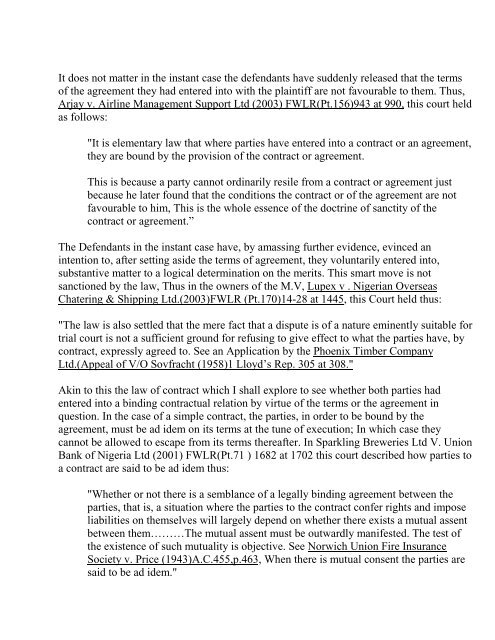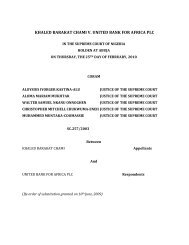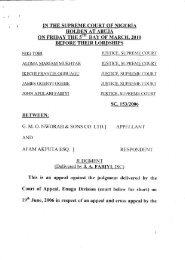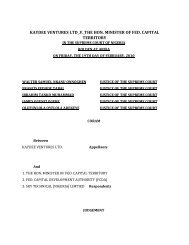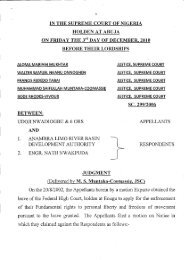attorney rivers state v. attorney- general, akwa ibom state in the ...
attorney rivers state v. attorney- general, akwa ibom state in the ...
attorney rivers state v. attorney- general, akwa ibom state in the ...
You also want an ePaper? Increase the reach of your titles
YUMPU automatically turns print PDFs into web optimized ePapers that Google loves.
It does not matter <strong>in</strong> <strong>the</strong> <strong>in</strong>stant case <strong>the</strong> defendants have suddenly released that <strong>the</strong> terms<br />
of <strong>the</strong> agreement <strong>the</strong>y had entered <strong>in</strong>to with <strong>the</strong> pla<strong>in</strong>tiff are not favourable to <strong>the</strong>m. Thus,<br />
Arjay v. Airl<strong>in</strong>e Management Support Ltd (2003) FWLR(Pt.156)943 at 990, this court held<br />
as follows:<br />
"It is elementary law that where parties have entered <strong>in</strong>to a contract or an agreement,<br />
<strong>the</strong>y are bound by <strong>the</strong> provision of <strong>the</strong> contract or agreement.<br />
This is because a party cannot ord<strong>in</strong>arily resile from a contract or agreement just<br />
because he later found that <strong>the</strong> conditions <strong>the</strong> contract or of <strong>the</strong> agreement are not<br />
favourable to him, This is <strong>the</strong> whole essence of <strong>the</strong> doctr<strong>in</strong>e of sanctity of <strong>the</strong><br />
contract or agreement.”<br />
The Defendants <strong>in</strong> <strong>the</strong> <strong>in</strong>stant case have, by amass<strong>in</strong>g fur<strong>the</strong>r evidence, ev<strong>in</strong>ced an<br />
<strong>in</strong>tention to, after sett<strong>in</strong>g aside <strong>the</strong> terms of agreement, <strong>the</strong>y voluntarily entered <strong>in</strong>to,<br />
substantive matter to a logical determ<strong>in</strong>ation on <strong>the</strong> merits. This smart move is not<br />
sanctioned by <strong>the</strong> law, Thus <strong>in</strong> <strong>the</strong> owners of <strong>the</strong> M.V, Lupex v . Nigerian Overseas<br />
Chater<strong>in</strong>g & Shipp<strong>in</strong>g Ltd.(2003)FWLR (Pt.170)14-28 at 1445, this Court held thus:<br />
"The law is also settled that <strong>the</strong> mere fact that a dispute is of a nature em<strong>in</strong>ently suitable for<br />
trial court is not a sufficient ground for refus<strong>in</strong>g to give effect to what <strong>the</strong> parties have, by<br />
contract, expressly agreed to. See an Application by <strong>the</strong> Phoenix Timber Company<br />
Ltd.(Appeal of V/O Sovfracht (1958)1 Lloyd’s Rep. 305 at 308."<br />
Ak<strong>in</strong> to this <strong>the</strong> law of contract which I shall explore to see whe<strong>the</strong>r both parties had<br />
entered <strong>in</strong>to a b<strong>in</strong>d<strong>in</strong>g contractual relation by virtue of <strong>the</strong> terms or <strong>the</strong> agreement <strong>in</strong><br />
question. In <strong>the</strong> case of a simple contract, <strong>the</strong> parties, <strong>in</strong> order to be bound by <strong>the</strong><br />
agreement, must be ad idem on its terms at <strong>the</strong> tune of execution; In which case <strong>the</strong>y<br />
cannot be allowed to escape from its terms <strong>the</strong>reafter. In Sparkl<strong>in</strong>g Breweries Ltd V. Union<br />
Bank of Nigeria Ltd (2001) FWLR(Pt.71 ) 1682 at 1702 this court described how parties to<br />
a contract are said to be ad idem thus:<br />
"Whe<strong>the</strong>r or not <strong>the</strong>re is a semblance of a legally b<strong>in</strong>d<strong>in</strong>g agreement between <strong>the</strong><br />
parties, that is, a situation where <strong>the</strong> parties to <strong>the</strong> contract confer rights and impose<br />
liabilities on <strong>the</strong>mselves will largely depend on whe<strong>the</strong>r <strong>the</strong>re exists a mutual assent<br />
between <strong>the</strong>m………The mutual assent must be outwardly manifested. The test of<br />
<strong>the</strong> existence of such mutuality is objective. See Norwich Union Fire Insurance<br />
Society v. Price (1943)A.C.455,p.463, When <strong>the</strong>re is mutual consent <strong>the</strong> parties are<br />
said to be ad idem."


